| SHADOWS ON THE WALL | REVIEWS | NEWS | FESTIVAL | AWARDS | Q&A | ABOUT | TALKBACK | |||||
 Shadows off the beaten path Shadows off the beaten pathIndies, foreign, docs and shorts...
On this page:
A DOG BARKING AT THE MOON |
JUST SEX, NOTHING PERSONAL |
WHO YOU THINK I AM
| |||||
| See also: SHADOWS FILM FESTIVAL | Last update 5.Apr.20 | |||||
|
A Dog Barking at the Moon Review by Rich Cline | 
| |||||
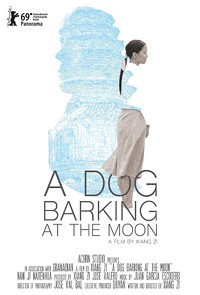 dir-scr Xiang Zi prd Jose Val Bal, Xiang Zi with Nan Ji, Na Ren Hua, Wu Renyuan, Thomas Fiquet, Zhang Yinyue, Jiang Bing, Kang Xuan, Ming Xing, Chen Zhenyuan, Li Fuzhu, Wang Xilu, Li Junyan release UK Mar.20 flare 19/China 1h47 BERLIN FILM FEST  |
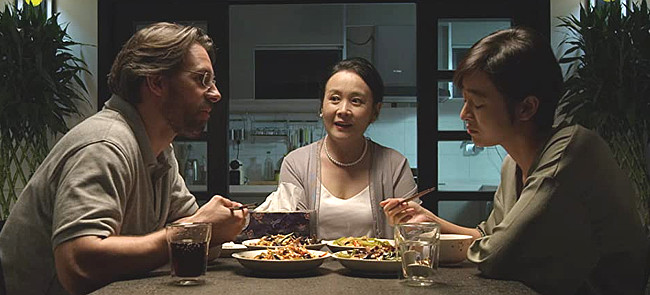 Flickering around in time adds some texture to this Chinese drama, which explores the strained relationships within a family. While the central idea of a woman putting up with her husband's homosexuality isn't unusual, it's addressed with some boldly provocative filmmaking choices and played with honesty and insight. And the artful way writer-director Xiang Zi keeps things understated is intriguing, even if it's perhaps a bit dull. Memories spark when writer Xiaoyu (Nan) and her husband Benjamin (Fiquet) arrive in China to visit her parents Jiumei and Tao (Na and Wu). Over the years, Xiaoyu (played as a girl by Zhang) watched her parents' relationship falter, but they stayed together as Jiumei (played as a younger woman by Jiang) put up with Tao's unexplained absences and surprise male guests. "Gossips can bury you alive," Jiumei says, knowing a bit too well what she's talking about. Then as Jiumei begins following a cult-like Buddhist master, Xiaoyu struggles to get her to see reason. The title refers to Joan Miro's painting, which includes an escape ladder. In this story the family dog Patton sticks close to Tao and barks at Jiumei. Xiang stages scenes with quiet tension, often in static takes that observe awkward interaction between people pretending to be nice. "If you have no intention of divorcing him," Xiaoyu says to her mother in exasperation, "stop talking about him all the time." But the relentlessly bitter Jiumei continues moaning about him, the unborn son she lost and her general misery. The actors are terrific, each playing a character churning with unresolved feelings. As a nasty passive-aggressive, Na vividly brings sparky Jiumei to life, increasingly unlikable as she lays her own problems on the people closest to her. Nan is more subdued as the pregnant Xiaoyu, who turns to Fiquet's quietly understanding foreigner for a steady hand after each of her mother's deeply cutting insults. Intriguingly, Wu remains largely off-screen, but Tao's gentle presence fills every scene. Most scenes take place indoors, in featureless rooms that feel oppressive, so it's no wonder the conversations are hushed. One telling meeting in a cafe, between Xiaoyu and her father's secret boyfriend (Chen), reveals a range of truths about how gay people must hide in plain sight in China. And as the story continues, shifting around in time, Zhiang begins to stir in fiendishly inventive stage sequences and some magical realism, offering glimpses into both the characters' mental states and larger societal issues.
| ||||
|
Just Sex, Nothing Personal Review by Rich Cline | 
| |||||
 dir Olga Ryashina prd Vladislav Ryashin scr Sergey Pritula, Valentin Sergiychuk, Vitaliy Tylnuy, Vladimir Kovtsun, Vladimir Zhoglo with Roman Lutskyi, Serhiy Pritula, Angelika Nikolaeva, Natalya Mazur, Andrey Danilko, Inna Bilokon, Inna Ostrovska, Oksana Grebeniok, Mikhailo Kabanov, Anna Matiychenko, Petro Maga, Vasyl Vasylyk release Ukr 20.Dec.18, US 27.Mar.20 18/Ukraine 1h38 |
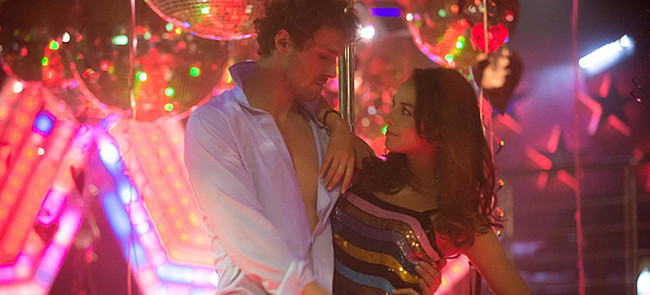 Bright and goofy, this Ukrainian comedy features lively performances and has a slick visual sheen. But while the topic at hand is sex, the film's prudish, farcical approach makes it merely a tease. And deep-rooted homophobia in the script is more than a little disturbing. Even so, the movie has an enjoyably harmless tone, as if a bunch of 12-year-olds were trying to teach each other about sex. When his girlfriend Lesia (Mazur) coldly dismisses his proposal, Lviv accountant Serhiy (Lutskyi) decides to take their planned Valentine's trip to Prague to see his party-loving pal Vasyl (Pritula). On his first night out, Serhiy meets Ukrainian pole dancer Diana (Nikolaeva) in a strip club, but his only thought is getting a sexy selfie to make Lesia jealous. The next day he agrees to help Diana sort out her finances if she coaches him about women. Then Lesia realises that Serhiy is her ticket to wealth, and heads to Prague on a mission. The rom-com setup is obvious, as are most of the jokes. Serhiy is of course a deeply nice guy who has simply never learned how to make a woman happy (that he never bothered to learn is oddly ignored). Otherwise smart, Diana is an airhead with money, and works as a dancer to save up to start a restaurant. Vasyl is willing to do whatever it takes to land a woman, even if that means turning monogamous. These elements spiral into chaos right on schedule, but there's never a question that it won't end with a smile. Lutskyi brings a likably dorky charm to Serhiy, almost making his ludicrous ignorance believable. That Diana dresses him in S&M gear is absurd, played as pure farce, but Lutskyi makes Serhiy's gullibility endearing. Still, it's impossible to understand why he's hung-up on Lesia and oblivious about Diana. Mazur adds some wit to her textbook manipulative backstabber, while Nikolaeva has spark as the thankless romantic lead. Meanwhile, popular TV comic Pritula effortlessly steals every scene he can. There's a more interesting comedy lurking in this premise, but the army of writers are interested only in simplistic storytelling that eliminates all complexity from sexuality. Basically, whenever the movie does try to get sexy, director Ryashina seems to become painfully embarrassed. So while a scene with a melon clearly aims to be seductive and rude, it has no impact at all until someone finally suggests the blindingly obvious.
| ||||
|
Who You Think I Am Celle que Vous Croyez Review by Rich Cline | 
| |||||
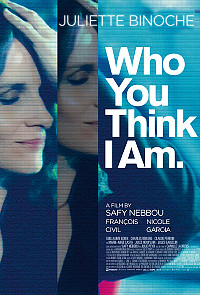 dir Safy Nebbou prd Michel Saint-Jean scr Safy Nebbou, Julie Peyr with Juliette Binoche, Nicole Garcia, Francois Civil, Guillaume Gouix, Charles Berling, Claude Perron, Marie-Ange Casta, Jules Houplain, Jules Gauzelin, Francis Leplay, Pierre Giraud, Sonia Mohammed Cherif release Fr 27.Feb.19, UK 10.Apr.20 19/France 1h41 BERLIN FILM FEST |
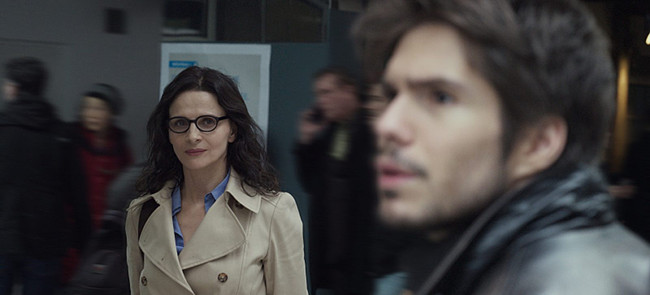 French filmmaker Safy Nebbou has a lot of fun with this dark and insinuating film's visual style, stirring innuendo and suspense into the imagery along with witty editing and an artful blurring of lines. The central idea is the unreliability of appearances, and indeed the movie feels like an enticing hybrid between sweet romcom and tricky Hithcockian thriller. And the way it plays out is thoroughly engaging. In Paris, 50ish university professor Claire (Binoche) shares custody of her teen sons (Houplain and Gauzelin) with her friendly ex-husband Gilles (Berling), who left her for a younger woman (Casta). Claire has just started with a new psychiatrist, Catherine (Garcia), and is telling her about being ghosted by her young boyfriend Ludo (Gouix). So she creates a 24-year-old fashion intern alter-ego on Facebook and begins to stalk him, starting with his hot assistant Alex (Civil), whom she's never met. Chatting online, they become friends, and then much more than that. Nebbou takes a slick, snaky approach, offering sexy glimpses beneath the surface using Gilles Porte's seductive cinematography and Ibrahim Maalouf swelling score. It's unclear if Claire is catfishing Alex out of frustration or to get revenge, and Nebbou gleefully suggests various possibilities, even that she's actually falling for Alex. So when he asks for a picture, Claire has to make a decision. From here, as she tells Catherine, the spiral begins. Binoche stirs an inner sadness into this bookish, middle-aged woman, but also offers glimpses of her youthful soul. As Claire recounts her tale to Catherine, it's impossible to tell what she might be making up. And there are hints that she lost her identity in her marriage as well. Because everything is seen through her eyes, she's the focal point of the entire film. So other characters are less defined, simply because that's as far as she has any interest in them. But Garcia and Berling both add some telling detail, and Civil and Gouix are excellent. As Catherine unpicks Claire's story, there are a cascade of twists, some of them tiny, others more momentous. They reveal details of her story and allow the viewer to delve into her imagination, cleverly catching us off guard with narrative surprises. While stirring in these smartly rug-pulling touches, Nebbou and Binoche cleverly coerce the audience into falling in love with this fraudulent woman, which makes the film a riveting blend of suspense, warmth, heartbreak and hope.
| ||||

See also: SHADOWS FILM FESTIVAL © 2020 by Rich Cline, Shadows
on the Wall
HOME | REVIEWS | NEWS | FESTIVAL | AWARDS
| Q&A | ABOUT | TALKBACK | | ||||

